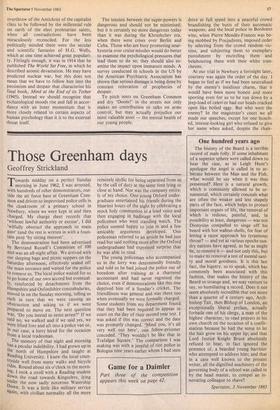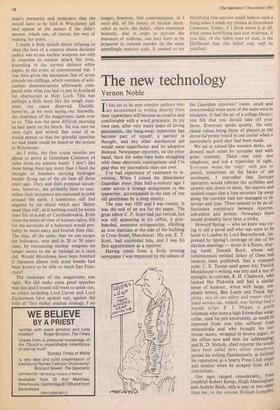Those Greenham days
Geoffrey Strickland
Towards midday on a perfect Sunday
morning in June 1962, I was arrested, With hundreds of other demonstrators, out- side the air force base at Greenham'Com- mon and driven to improvised police cells in the cloakroom of a primary school in Newbury, where we were kept in and then charged, My charge sheet records that 'without lawful authority or excuse', I did 'wilfully obstruct the approach to main gate' (and the rest is written in with a foun- tain pen) 'by sitting thereon'.
The demonstration had been advertised by Bertrand Russell's Committee of 100 and was an all-night affair. We arrived with our sleeping bags and picnic suppers on the Saturday afternoon, effectively sealed off the main entrance and waited for the police to remove us. The local police waited for us to go home of our own accord but eventual- ly, reinforced by detachments from the Hampshire and Oxfordshire constabularies, Moved in on the Sunday morning, telling us each in turn that we were causing an obstruction and asking us if we were Prepared to move on. The next question Was, 'Do you intend to resist arrest?' If we said no, we walked and if we said yes, we were lifted fore and aft into a police van or, in our case, a lorry hired for the occasion from a local tradesman.
The memory of that night and morning has a pecular indelibility. I had grown up in the north of Hampshire and taught at Reading University. I knew the local coun- tryside well from many walks and bicycle rides. Round about six o'clock in the morn- ing, I took a stroll with a Reading student down the road towards Kingsclere, lying tinder the now sadly notorous Watership Down. It was a little like military service again, with civilian normality all the more
remotely idyllic for being separated from us by the call of duty at the same time lying so close at hand. Nor was the company entire- ly of my choice. One young Oxford under- graduate entertained his friends during the bleariest hours of the night by celebrating a mock holy communion in a loud voice and then engaging in badinage with the local policemen who were standing watch. The police seemed happy to join in and a few amicable arguments developed. One policeman referred to an article he had just read but said nothing more after the Oxford undergraduate had expressed surprise that he was able to read.
The young policeman who accompanied us in the lorry was determinedly friendly and told us he had joined the police out of boredom after training as a chartered accountant and had never regretted the choice, even if demonstrations like this one deprived him of a Sunday's cricket. The friendliness was general and was there too when eventually we were formally charged. Some students from my department found that they had been required to appear in court on the day of their second year test. I was asked if this was correct and the date was promptly changed. 'Mind you, it's all very well out here', one fellow-prisoner conceded. 'They wouldn't be like that in Trafalgar Square.' The comparison I was making was with a jeepful of riot police in Bologna nine years earlier whom I had seen drive at full speed into a peaceful crowd brandishing the butts of their automatic weapons, and the local police in Bordeaux who, when Pierre Mendes-Frances was be- ing mobbed by Poujadistes, imposed order by selecting from the crowd random vic- tims, and subjecting them to exemplary punishment by encircling them and belabouring them with their white trun- cheons.
At our trial in Newbury a fortnight later, courtesy was again the order of the day. I began to feel as if we had been neutralised by the enemy's insidious charm, that it would have been more honest and more sporting even for us to be run down by a jeep-load of celeri or had our heads cracked open like boiled eggs. But who were the enemy? In the magistrate's court we all made our speeches, except for one hunch- ed, intense-looking girl who refused to give her name when asked, despite the chair-
man's entreaties and reminders that she would have to be held in Winchester jail and appear at the assizes if she didn't answer, which was, of course, her way of making her point.
I made a little speech about refusing to obey the laws of a country whose declared policy was to use nuclear weapons not only in response to nuclear attack but even, according to the current defence white paper, in the event of conventional war. I was then given the maximum fine of seven pounds ten shillings, which veterans of anti- nuclear demonstrations afterwards com- pared with what you had to pay in Scotland for obstruction at Holy Loch. This was perhaps a little more like the rough treat- ment our cause deserved. Outside, however, as we were saying our farewells, the chairman of the magistrates came over to us. This was the most difficult morning he had spent on the bench. He was sure we were right and wished that some of us would appeal so that the splendid speeches we had made could be heard at the assizes in Winchester.
As I write, the first cruise missiles are about to arrive at Greenham Common 14 miles from my present home. I don't like them being there any more than I liked the thought of bombers carrying hydrogen bombs flying out of the air base all those years ago. They and their eventual succes- sors, however, are probably here to stay, unless their successors are stationed in orbit around the earth. I sometimes still feel angered by the idiocy which says 'Better dead than red', as if nothing could be worse than life in a sort of Czechoslovakia. Even from the point of view of human rights, life for the survivors of a holocaust would pro- bably be more nasty and brutish than that. The idea, all the same, that we can escape the holocaust, now and in 20 or 50 years time, by renouncing nuclear weapons no longer seems to me as rational as it once did. Would Hiroshima have been bombed if Japanese planes with atom bombs had been known to be able to reach San Fran- cisco?
The chairman of the magistrates was right. We did make some good speeches that day and I would still want to speak out, as others including Lord Carver and Lord Zuckerman have spoken out, against the folly of 'first strike' nuclear strategy. I no longer, however, feel contemptuous, as I once did, of the theory of nuclear deter- rence as such: the belief, when expressed honestly, that in order to prevent the massacre of millions, one may have to be prepared to commit murder on the same appallingly massive scale. It seemed to me horrifying that anyone could believe such a thing when I made my protest at Greenham Common. Today, if I think about it at all, what seems horrifying and new evidence, it' you like, of the fallen state of man, is the likelihood that this belief may well be justified.















































 Previous page
Previous page